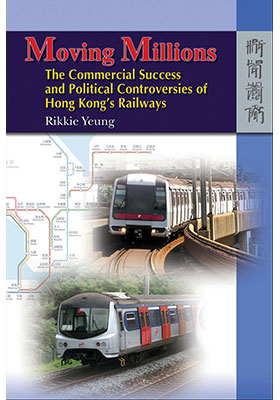Moving Millions
The Commercial Success and Political Controversies of Hong Kong’s Railway
(百萬人的運輸:香港的鐵路的商業成功和政治爭議)
ISBN : 978-962-209-882-4
May 2008
332 pages, 6″ x 9″, 2 figures & 22 tables
Ebooks
Also Available on
With the “merger” of the MTRC and the KCRC in 2007, the history of Hong Kong’s railways turned a new page. The two government-owned corporations were exceptionally profitable. Yet, this commercially successful railway model was not without social costs and political controversies.
Moving Millions critically examines the governance history of the MTRC and the KCRC over the past three decades, and sheds light on the challenges to Hong Kong’s railway after the “merger”. The author discusses complex relationships between railway management, government policy and politics. Critical issues are analysed, including corporate governance; railway-property development; funding and managing new projects; mismanagement and controversies; public accountability; and passenger interest in fares, choice and convenience.
The book compares how differently the MTRC and the KCRC dealt with the government, civil society, the market, and with each other to achieve commercial objectives and tackle public interests issues in a post-industrial society, where public expectations are rising despite constraints in democracy.
“Dr Rikkie Yeung’s pioneer volume not only provides an excellent comparative analysis of Hong Kong’s two railway corporations up to their ‘merger’ in 2007, but also examines critical issues of railway governance and politics. Moving Millions goes beyond transport planning and infrastructure. It entails balancing complex public, corporate, and passenger interests. This book draws some timely lessons from the past as the merger company charts its new course.” —Professor Anthony B. L. Cheung, President, The Hong Kong Institute of Education; Member, Hong Kong SAR Executive Council
“Providing mobility to millions is a matter of political choice. This is a clearly told story of missteps and missed opportunities in the slow expansion of rail in Hong Kong, when it could have been much faster.” —Christine Loh, CEO, Civic Exchange
“Authoritative, lively and often provocative, Moving Millions is an important contribution to our understanding of Hong Kong’s astonishing success. It reveals how in this ultra-capitalist city, bureaucrats were left to create a railway system that is among the safest, cleanest and fastest in the world—operating at low fares and without a subsidy from the taxpayer. The author investigates the strengths and weaknesses of this unusual business model: an efficient public enterprise which is also a flourishing property developer. With meticulous research, she assesses the political conflicts and the economic and social dilemmas involved. Dr Yeung has produced a path-breaking case study of corporate governance.” —Leo Goodstadt, author of Uneasy Partners and Profits, Politics and Panics
“Dr Rikkie Yeung has tackled an important problem of modern public policy: how to ensure good performance and accountability for public institutions when democratic mechanisms are either ineffective or non-existent. She has done so in a skilful and insightful way—by comparing two organisations that have done the same task (provide transportation services) in the same political environment (Hong Kong since 1970). The results of her comparison of the Mass Transit Railway Corporation and the Kowloon Canton Railway apply well beyond the immediate subject. Moving Millions is certainly about how the MTRC did a better job than the KCRC and why, but it also concerns effective governance in technocratic societies. It is well worth reading.” —Richard C. Bush, Senior Fellow, Director, Center for Northeast Asian Policy Studies, The Brookings Institution
“A comprehensive and insightful book, appropriately informed by significant governance and policy perspectives. An essential read for anyone seeking to understand arrangements so vital to the life and vibrancy of Hong Kong.” —Professor Ian Thynne, Chair Professor of Governance, Charles Darwin University, Australia





